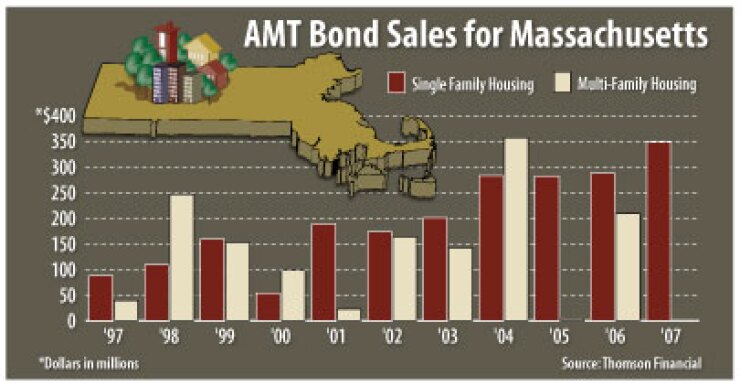
Massachusetts officials Monday announced the state's 2008 private-activity bond capacity allocations, with the affordable housing sector receiving the largest boost in financing.
Of the Bay State's overall $585 million of PAB volume capacity for the current year, the Massachusetts Housing Finance Agency received the largest distribution, $270 million, followed by the Massachusetts Development Finance Agency with $185 million, and the Massachusetts Educational Financing Authority with $90.3 million. In addition, the state reserved $40 million for public housing projects.
MassHousing and MassDevelopment affordable housing projects for both multifamily and single-family dwellings will receive $395 million of PAB financing, up from $275 million allocated to the sector in 2007.
Jay Gonzalez, undersecretary of administration and finance, the department that allocates PAB volume capacity, said the cost of housing in Massachusetts is relatively high in comparison to other states, an obstacle in attracting workers and businesses to the commonwealth. Increased PAB borrowing for affordable housing could help Massachusetts address that problem.
"This is all geared toward a general policy position on the part of the administration that we need to be doing as much as we can to create and preserve affordable housing in Massachusetts to grow our economy," Gonzalez said. "It's a major issue in Massachusetts and so volume cap is a really valuable resource toward being able to preserve and create affordable housing. We want to use it more effectively than it has been used in the past to ensure that we're extracting as much out of it as possible and targeting it as effectively as possible to the affordable units."
Using private-activity bond capacity more effectively includes two new restrictions. One is that multifamily projects that contain 80% market-rate apartments and 20% affordable apartments have a limit of $250,000 of PAB borrowing per affordable unit. The second is that multiple dwelling developments that offer more than 20% of units as affordable dwellings must utilize federal tax credits to generate more funds.
"By increasing the amount we're allocating to multifamily projects and by requiring that any projects that are receiving volume cap are leveraging that federal tax credit equity, we're going to leverage a significant amount of additional subsidies to do affordable housing," Gonzalez said.
MassHousing's $270 million allocation, up from $175 million in 2007, will offer $170 million for multifamily housing projects and another $100 million for single-family home loans to first-time homebuyers. That $100 million is double the amount the state distributed to single-family PAB borrowing last year, as more homebuyers are having a tough time obtaining low-cost financing in the current credit-crunch market.
"Last year, our lending for home ownership was up 61% from the previous year, and there is still intense demand for our loans,"MassHousing spokesman Eric Gedstad wrote in an e-mail. "We believe this is fueled by the meltdown of the subprime lending business. There is a flight to quality by borrowers and with our low, fixed interest rates and no-nonsense, no-hidden fee approach to lending, people see MassHousing as a trustworthy lender."
Of the agency's $185 million allocation, $85 million will go towards multifamily housing while economic development projects will gain $100 million of private-activity bond financing. Last year the authority received a $200 million PAB distribution, with half of that amount earmarked for multiple-dwelling developments.
The MEFA will have $90.3 million of PAB capacity to support its low-interest student loan program for higher education, down from the $154 million distribution the authority received in 2007 but similar to the $96 million allocation it received in 2006.
Private-activity bonds are tax-exempt bonds that the tax code allows state and local governments to issue to offer low-cost financing for private projects that serve a public purpose. Massachusetts anticipates the federal government will grant the $548 million of PAB capacity in 2008 under a population-based formula and the $37 million of unused capacity it expects to carry over from 2007. q





